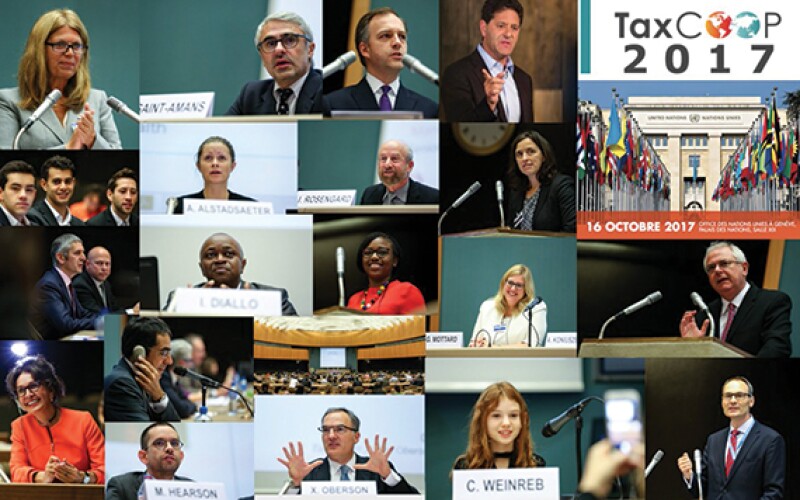
|
TaxCOOP is a new entry this year |
The movement was founded in 2015 by filmmaker and tax policy adviser, Brigitte Alepin; taxation professor, Allison Christians; tax policy adviser, Lyne Latulippe; and adjunct professor, Louise Otis. The four women are dedicated to combating harmful tax practices, specifically tax competition. Through TaxCOOP, they are offering tax leaders and organisations a neutral convention at which to discuss global tax initiatives and engage the wider public.
It was back in 2005 that Alepin, who herself was named in the Global Tax 50 in 2015, began to think about a conference that would discuss tax competition and cooperation. She had been at Harvard doing research on how to adapt the international tax system to globalisation and, at the time, had thought for sure that in the near future either the OECD or the UN would start a global conference on these issues. But after seven years with no conference in sight, she went to the Ordre des CPA du Québec (Quebec Chartered Professional Accountants Order) to ask for assistance in developing a global conference exclusively designed to reflect on issues of tax competition, discover new initiatives and hear what world experts have to say. By this point, Alepin had written two books, entitled 'The Wealthy Who Pay No Taxes' and the 'Coming Fiscal Crisis', and written and directed an award-winning film, 'The Price We Pay', in collaboration with director Harold Crooks. Moreover, she had been mandated by the Canadian government to find a solution to global tax issues – so it was no surprise when she got the go-ahead for the first TaxCOOP conference in Montreal in 2015.
Since then, the founders' dream of travelling the conference around the world has become a reality. In 2016, TaxCOOP was hosted at the World Bank in Washington, and in 2017 at the UN in Geneva. There are ambitions to hold it at the OECD in Paris in 2018, and in London and Montreal in 2019 and 2020, respectively.
The success of the debut conference saw TaxCOOP's profile grow, and its team has expanded in response. "If we want to modernise the tax system we have to work as a team," Alepin tells International Tax Review. The combination of Christian's technical understanding of taxation, Latulippe's hands-on approach and Otis's established connections in the industry have made TaxCOOP a force to be reckoned with. "It's a dream team," Alepin says, citing their ability to bring together high-profile business leaders and think tanks to participate in debates and discussions to extend the frontier of knowledge in global taxation. But Alepin thinks "it's still quite surprising that no one is really discussing tax competition at the level we would like".
TaxCOOP has brought together finance ministers, entrepreneurs, government officials and non-governmental organisations and academics to create an open dialogue on tax equity. Alepin says she is most proud of how the forum's work actively engages young people. "I needed to build a project that could reach the universities to give the younger generations the opportunity to participate, so I thought about the forum on the next generation," Alepin says. "This year's forum was designed to discuss tax ethics with the youth to encourage interest, with live online streaming and an eight-year-old tax expert, Carlie Weinreb, on the panel. "We want to modernise the tax system and if we say want to do it for the next generation we should include them in the conversation," Alepin says.
Alepin also highlights the debate on tax transparency between contributors from a diverse range of backgrounds as being a particularly proud moment. "This year's debate at the TaxCOOP was the first time I felt it was a real debate," Alepin says. The outcome of the debate being that all panellists agreed on the overall adoption of tax transparency requirements as beneficial to tax administrations, essential to control compliance and useful information to the public.
Allowing ideas to evolve through the collaboration of those with diverse perspectives ultimately brings together the range of stakeholders from different ends of the spectrum. "It's not difficult to convince the head of tax to speak about tax to the International Fiscal Association, but to have business leaders speak about tax at the UN is a real achievement," Alepin says.
TaxCOOP will be releasing a new book, inspired by events from the conference in 2016, called 'Winning the Tax Wars'. It focuses on seminars at the World Bank about how developing countries can fight tax competition to stop businesses undermining their ability to build state capacity. In an ever-changing social, political and economic environment, the TaxCOOP signifies a crucial influence in global tax reform. After all, it's not just a conference; it's a place where solutions can be made for global tax issues.
The Global Tax 50 2017 |
|
|---|---|
The top 10 • Ranked in order of influence |
|
6. Arun Jaitley |
|
The remaining 40 • In alphabetic order |
|
| The Estonian presidency of the Council of the European Union |
|
| International Consortium of Investigative Journalists (ICIJ) |
|
| United Nations Committee of Experts on International Cooperation in Tax Matters |
|









